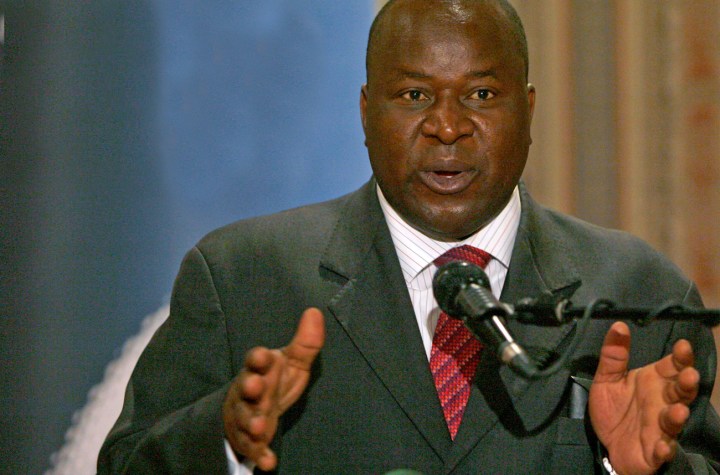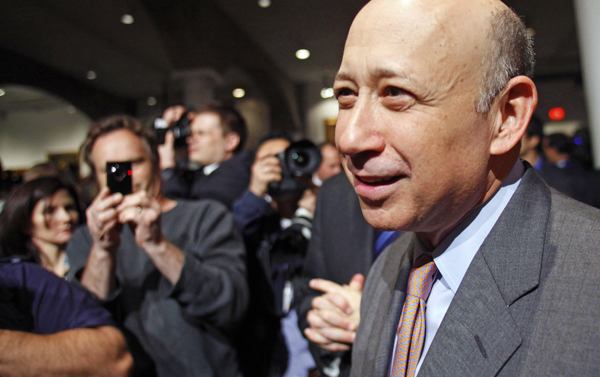Business Maverick, Politics
Tito Mboweni joins Goldman Sachs as international advisor

In an example of extraordinary timing, the former South African Reserve Bank governor has added his considerable clout to the company that is now under US Securities and Exchange Commission investigations and being attacked from just about every corner of the financial globe.
On Sunday, Goldman Sachs announced that Mboweni had joined the company as an international advisor “to provide strategic advice to the firm on business development opportunities, with a particular focus on South Africa and Sub-Saharan Africa”. Following Mboweni’s successful leadership of the Reserve Bank for a full, tumultuous decade, and his previous service for the ANC in various senior party and government positions in economics and finance, this newest appointment adds to his other five-star gigs as AngloGold Ashanti and Nampak chairman.
Mboweni’s new appointment points to Goldman Sachs’ obvious intent to be even better informed and increasingly well placed in the years to come, so as to take advantage of future deals and investments in Africa’s strategic commodities and raw materials, and with its growing markets, spreading risk and broadening its chances of finding new profits.
Meanwhile, half a world away, a tale of insider bets involving Goldman Sachs continues to unfold in the US. This began with charges filed by the US SEC that Goldman Sachs had colluded with hedge fund manager John Paulson to market a bond based on housing loans that – without telling most of its potential investors – had basically been designed to fail. And, in contrast to many trusting and unknowing investors who must have read and believed Goldman Sachs’ prospectus, the giant investment bank and its hedge fund partner had actually earned their profits when they sold these bonds short (i.e. bet they would fall in value) as, indeed they did shed much of its value when the housing market went belly up.
Which kinda clashes with Goldman Sachs’ prospectus in 1999, when it first went public:
“Our clients’ interests always come first. Our experience shows that if we serve our clients well, our own success will follow. Our assets are our people, capital and reputation. If any of these is ever diminished, the last is the most difficult to restore.”
Now, making things still hotter for Goldman Sachs over the weekend, the US Senate permanent subcommittee on investigations released some potentially very awkward “smoking gun” emails such as a November 2007 one from Lloyd Blankfein, Goldman Sachs’ chief executive officer, where he acknowledged that his company had lost money initially as the financial sector started to tank, but then the company recovered through its negative bets or short positions, thereby making some serious folding money as housing prices were dropping. Or, as Blankfein himself had written, “Of course, we didn’t dodge the mortgage mess. We lost money, then made more than we lost because of shorts.” Somebody’s gotta practice using that “empty trash” button much, much more often!

Photo: Goldman Sachs Chief Executive Officer Lloyd Blankfein attends a speech by U.S. President Barack Obama about Wall Street reform at Cooper Union in New York April 22, 2010. REUTERS/Natalie Behring
Which, inevitably, recalls the lines from “Casablanca”:
Rick: How can you close me up? On what grounds?
Captain Renault: I’m shocked, shocked to find that gambling is going on in here! [a croupier hands Renault a pile of money]
Croupier: Your winnings, sir.
Captain Renault: [sotto voce] Oh, thank you very much.
Democratic Senator Carl Levin, head of the permanent subcommittee on investigations, said the emails he had seen flatly contradicted the company’s public statements. “The 2009 Goldman Sachs annual report stated that the firm ‘did not generate enormous net revenues by betting against residential related products’. These e-mails show that, in fact, Goldman made a lot of money by betting against the mortgage market,” Levin said. Captain Renault would have been shocked all over again.
The messages seem to spell out how, as most other banks were gushing red ink in 2007 because of the falling value of mortgage holdings, Goldman had actually done rather well, thank you very much.
Now, for its part, Goldman Sachs is denying it made much of a profit on mortgage-based investment vehicles in 2007 or 2008. Instead, it has argued the subcommittee had “cherry-picked” the juiciest emails from about 20 million pages of documents just to prove its point. Shock and horror again.
The furore over Goldman Sachs’ behaviour during the financial meltdown has now joined up with America’s increasingly rancorous debate over financial reform. US President Barack Obama publicly set out his position in a speech in New York late last week – and then underscored his views in his weekly Saturday radio address, charging that Wall Street had “hurt just about every sector of our economy”. (Listen out, if you can, for the still-distant march of an approaching US midterm election in November.)
Looking forward to the beginning of this week, Democrats will attempt to forestall a Republican filibuster (unlimited debate) in the Senate before it even starts, as a major test of the Obama administration’s desire to pass pending financial reform legislation. And you can bet on this one: Almost guaranteed to generate fireworks will be testimony from Blankfein and six other current and former Goldman Sachs top officers at a Congressional hearing this week on the financial shenanigans that may have taken place over at Goldman Sachs during the heady days of the great meltdown. They could well use any advice Mboweni can offer. But it does look as if they will realise they need lawyers too.
By J Brooks Spector
For more, read the New York Times, the AP, the Washington Post and the Sunday Times
Watch: Captain Renault’s immortal lines


















 Become an Insider
Become an Insider